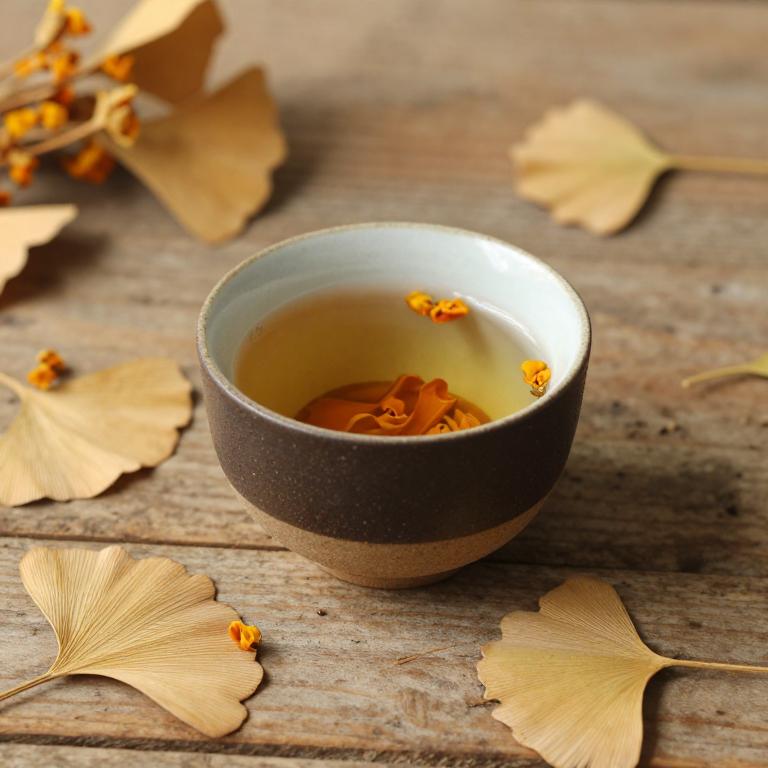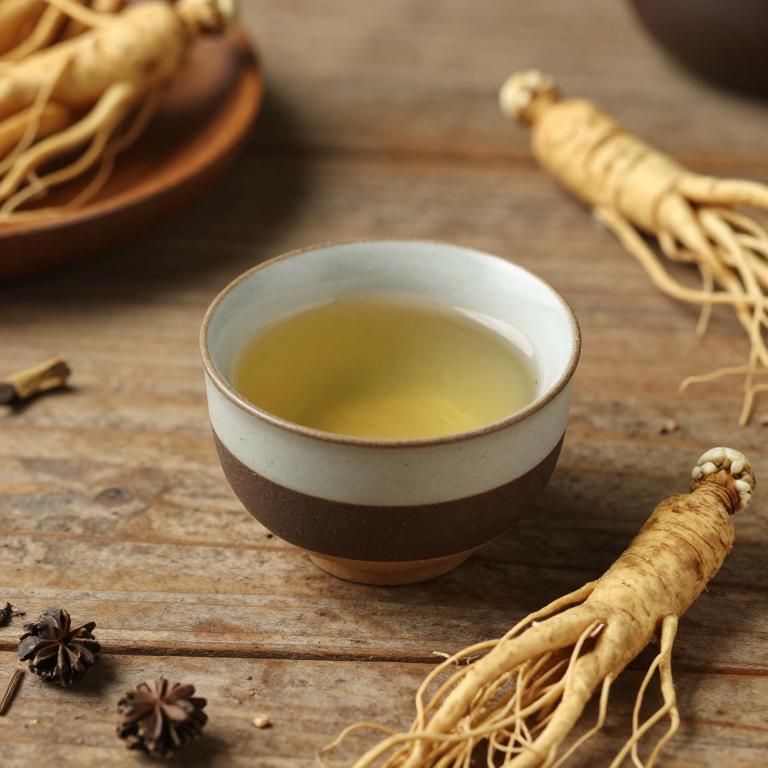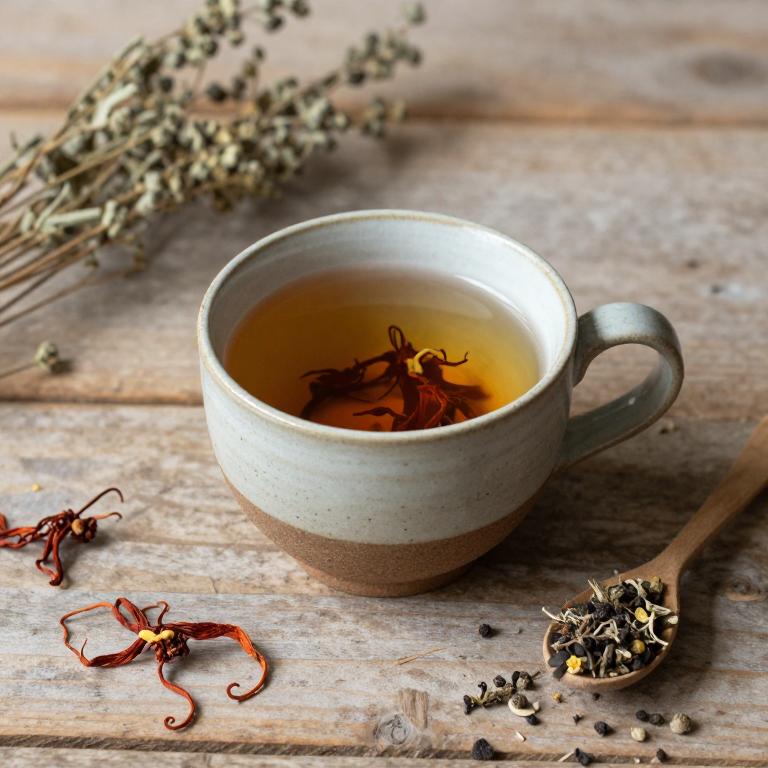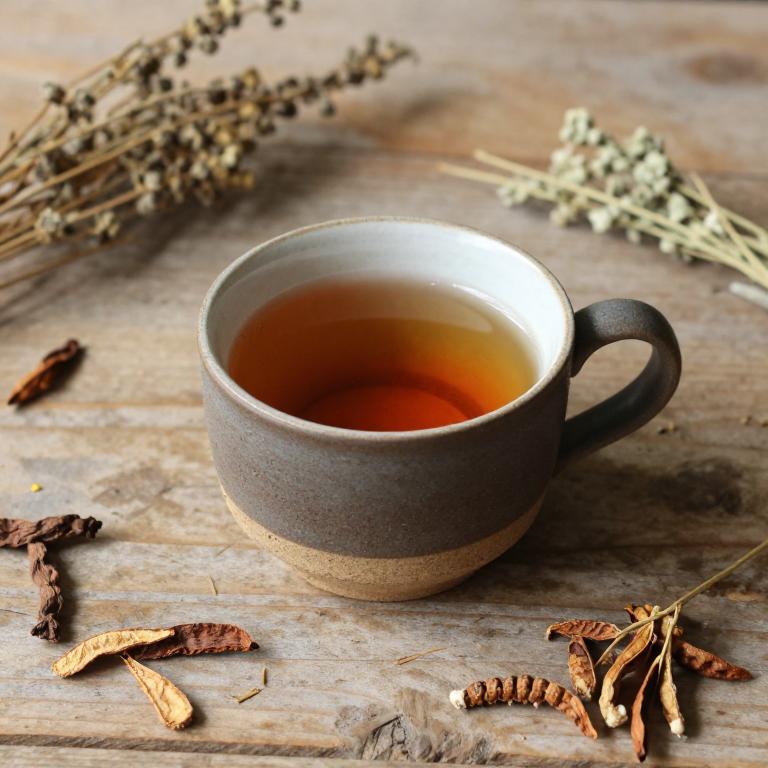10 Best Herbal Teas For Brain Fog

Herbal teas can be a natural and effective way to help alleviate brain fog by promoting mental clarity and cognitive function.
Ingredients like ginseng, gotu kola, and holy basil are known for their ability to enhance focus and reduce mental fatigue. These teas work by improving blood flow to the brain, reducing inflammation, and supporting the nervous system. Regular consumption of these herbal infusions may help combat the symptoms of brain fog, especially in individuals experiencing stress or lack of sleep.
Incorporating herbal teas into a daily routine can be a gentle and holistic approach to supporting brain health and mental alertness.
Table of Contents
- 1. Ginkgo (Ginkgo biloba)
- 2. Panax ginseng (Panax ginseng)
- 3. Golden root (Rhodiola rosea)
- 4. Salvia (Salvia officinalis)
- 5. Chaste tree (Vitex agnus-castus)
- 6. Turmeric (Curcuma longa)
- 7. St. john's wort (Hypericum perforatum)
- 8. Ashwagandha (Withania somnifera)
- 9. Echinacea (Echinacea purpurea)
- 10. Stinging nettle (Urtica dioica)
1. Ginkgo (Ginkgo biloba)

Ginkgo biloba herbal tea is made from the leaves of the ginkgo tree, a plant known for its potential cognitive-enhancing properties.
It is often consumed to help alleviate symptoms of brain fog, which can include mental fatigue, difficulty concentrating, and a general sense of mental cloudiness. The tea contains bioactive compounds such as flavonoids and terpenoids, which are believed to improve blood circulation and support brain function. Regular consumption of ginkgo biloba tea may help enhance memory and mental clarity by promoting better oxygen flow to the brain.
However, it is important to consult with a healthcare professional before using this tea, especially for individuals with existing health conditions or those taking other medications.
2. Panax ginseng (Panax ginseng)

Panax ginseng herbal tea is a traditional remedy known for its potential to enhance cognitive function and alleviate brain fog.
Rich in adaptogenic compounds, it helps the body manage stress and improve mental clarity by supporting the nervous system. The bioactive components in ginseng, such as ginsenosides, may promote blood flow to the brain and reduce mental fatigue. Drinking this tea regularly can contribute to improved focus, memory, and overall mental alertness.
It is often recommended as a natural alternative to stimulants for those seeking to boost brain performance without harsh side effects.
3. Golden root (Rhodiola rosea)

Rhodiola rosea, also known as the "golden root," is an adaptogenic herb that has been traditionally used to enhance mental performance and reduce stress.
Herbal teas made from rhodiola rosea are gaining popularity for their potential to alleviate brain fog, a condition characterized by mental fatigue, confusion, and difficulty concentrating. The active compounds in rhodiola, such as rosavins and salidrosides, are believed to support cognitive function by improving oxygen utilization and reducing oxidative stress in the brain. Drinking rhodiola rosea tea may help boost mental clarity and energy levels, making it a natural remedy for those experiencing mental fatigue.
However, it is important to consult with a healthcare professional before incorporating this herb into your routine, especially if you are taking other medications or have existing health conditions.
4. Salvia (Salvia officinalis)

Salvia officinalis, commonly known as sage, has gained attention for its potential to alleviate brain fog through its rich array of bioactive compounds, including flavonoids and rosmarinic acid.
These components are believed to support cognitive function by reducing oxidative stress and inflammation in the brain. Herbal teas made from dried sage leaves can be a natural and soothing way to incorporate these benefits into daily routines. Many individuals report improved mental clarity and focus after regular consumption of sage tea, though more research is needed to fully understand its mechanisms.
As with any herbal remedy, it's advisable to consult a healthcare provider before use, especially for those with existing health conditions or on medication.
5. Chaste tree (Vitex agnus-castus)

Vitex agnus-castus, commonly known as chasteberry, has been traditionally used in herbal medicine to support hormonal balance and alleviate symptoms such as brain fog.
This herb is believed to influence the pituitary gland, potentially improving communication between the hypothalamus and the pituitary, which may help reduce mental cloudiness and enhance cognitive clarity. Herbal teas made from vitex agnus-castus are often consumed as a natural remedy for women experiencing hormonal fluctuations, such as during menstruation, menopause, or pregnancy. While research on its direct impact on brain fog is limited, many users report improved focus and mental alertness after regular consumption.
As with any herbal remedy, it is advisable to consult a healthcare provider before incorporating vitex into one's regimen, especially for those with existing medical conditions or taking other medications.
6. Turmeric (Curcuma longa)

Curcuma longa, commonly known as turmeric, is widely used in herbal teas to support cognitive function and alleviate brain fog.
The active compound in turmeric, curcumin, possesses strong anti-inflammatory and antioxidant properties that may help reduce oxidative stress and inflammation in the brain. Regular consumption of turmeric tea has been associated with improved mental clarity and enhanced focus, making it a popular natural remedy for those experiencing mental fatigue. Additionally, turmeric tea can be combined with other herbs like ginger or black pepper to enhance absorption and overall effectiveness.
While it is generally safe, individuals with certain health conditions should consult a healthcare provider before incorporating turmeric into their routine.
7. St. john's wort (Hypericum perforatum)

Hypericum perforatum, commonly known as St. John's wort, is a herbal remedy that has been traditionally used to support mental health and cognitive function.
When brewed into a tea, it may help alleviate symptoms of brain fog by potentially enhancing mood and reducing anxiety, which are often linked to mental cloudiness. The herb contains compounds like hyperforin and hypericin, which are believed to influence neurotransmitter levels in the brain. While some studies suggest it may offer mild cognitive benefits, it is important to consult a healthcare provider before use, as it can interact with certain medications.
Overall, hypericum perforatum herbal tea may be a natural option for those seeking to improve mental clarity, though its effectiveness can vary among individuals.
8. Ashwagandha (Withania somnifera)

Withania somnifera, commonly known as ashwagandha, is an adaptogenic herb widely used in Ayurvedic medicine to support cognitive function and reduce mental fatigue.
When brewed into herbal teas, it may help alleviate brain fog by promoting mental clarity and reducing stress-related cognitive impairment. The active compounds in ashwagandha, such as withanolides, are believed to modulate neurotransmitter activity and enhance neuroprotective effects. Drinking ashwagandha tea regularly may improve focus, memory, and overall mental alertness.
However, it is advisable to consult a healthcare professional before incorporating it into a daily routine, especially for individuals with existing health conditions or those taking medications.
9. Echinacea (Echinacea purpurea)

Echinacea purpurea, commonly known as purple coneflower, is a popular herbal remedy often used to support immune health, but it may also offer benefits for cognitive function.
Some studies suggest that echinacea contains compounds like alkamides and flavonoids, which may help reduce inflammation and oxidative stress in the brain, potentially alleviating symptoms of brain fog. When brewed into a tea, echinacea can be a gentle and natural way to incorporate these benefits into daily routines. However, it is important to note that while some individuals report improved mental clarity after consuming echinacea tea, more research is needed to fully understand its effects on brain fog.
As with any herbal supplement, it is advisable to consult a healthcare provider before use, especially for those with existing health conditions or taking other medications.
10. Stinging nettle (Urtica dioica)

Urtica dioica, commonly known as stinging nettle, is a versatile herb that has been traditionally used for its numerous health benefits, including its potential to alleviate brain fog.
When brewed into a herbal tea, stinging nettle is believed to support cognitive function by promoting the removal of heavy metals and toxins from the body, which can contribute to mental clarity. The tea is rich in antioxidants, vitamins, and minerals that may help reduce inflammation and enhance overall brain health. Some studies suggest that the compounds in stinging nettle may support the nervous system and improve focus and alertness.
While more research is needed, many individuals report feeling a renewed sense of mental clarity after regularly consuming urtica dioica herbal tea.